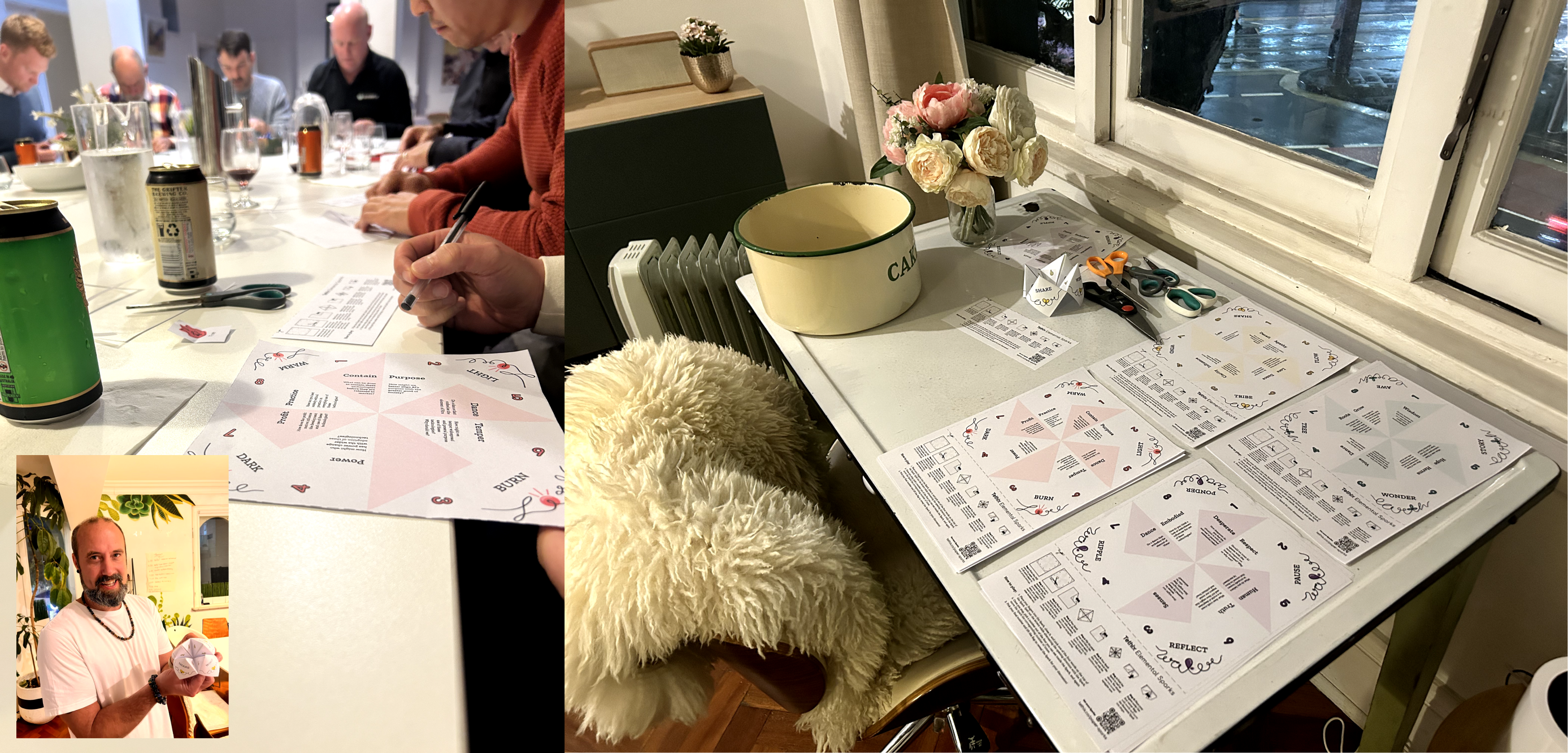When was the last time you really played with a serious topic? Like, danced with it, felt its rhythm, and let your body lead the conversation without a script?
I recently had the pleasure of being a special guest and facilitating a ‘Finding Nature’ event on AI, contributing to a series of activities designed to spark deeper engagement. It’s a path I’ve wandered many times, each journey bringing its own unique twists and turns. But as is typical at Tethix, it’s usually about getting playful with the weighty stuff—like ethics in AI, the social and environmental impacts, deeper philosophical questions about life, and our existence and future on this planet. These aren’t your usual light-hearted dinner table conversations, and we often approach these topics, well, sometimes a little too seriously.
This particular event carried its weight with discussions framed around AI’s distressing realities, such as sexploitation and its impacts on Child Sexual Abuse Material (CSAM) monitoring, through to the grandiose dreams and ecological ramifications of pursuing a pathway to AGI—including the absurd proposition of securing 7 trillion USD for the necessary compute power. Using serious play can take some of the weight off of these topics and make them approachable and easier to engage with.
We kicked off with a lucky dip from a cake tin turned treasure chest, with each participant drawing a piece of paper representing one of the four elements: Earth, Air, Fire, or Water. Each person pondered their element—what it meant to them at that moment and how they could embody this element throughout the evening’s activities. Yes, one of the prompts even suggested embodying your element through dance, which I demoed (quite awkwardly, to be honest), and no, thankfully, there’s no video evidence (that I know of)!
The elemental embodiment was more than just an icebreaker; it was a bridge to deeper engagement. Participants were given a paper spark that we created to match the themes for this event and were asked to cut out, fold, and use in a few rounds of one-on-one conversations.

Although only one brave soul danced, the energy and shared learning that unfolded was profoundly impactful. Lots of high-energy dialogue with open minds and hearts ensued, with one participant telling me that they felt they could be water and respond more fluidly through the complex topics of conversation.
Why this method? Because play breaks down barriers, making tough topics accessible and sparking joy amid deep reflection. It transforms spaces into playgrounds, encourages us to embody our thoughts and feelings, and opens up new ways to see and solve problems.
Serious play isn’t just about bringing some fun and novelty. It’s a powerful method for engaging in complex topics, activating different parts of our brains and bodies. Inviting us to explore topics like AI ethics not just with our minds but with our entire being. From the ecological footprints we leave behind as we pursue paths to create intelligent life, to the ethical dilemmas we navigate, play helps us tackle these with an open heart, a flexible body, and a spirited mind.
Serious play is ideal for events like those run by Finding Nature which are intimate gatherings with important themes for conversation, delicious food and beverages, attracting really warm and wonderful people. If you reside in Sydney, I do suggest checking them out and attending. At Tethix, we’ve been talking and thinking that the spaces and places for communing, for sense-making, and learning—both place-based and online—are lacking. This important social infrastructure is sorely needed at a time when we are facing some serious challenges as societies and as a species. Many of which we need to work through together, ideally with some play too.
At Tethix, this playful orientation and creating conditions for moral imagination is central to our methods and at the heart of the digital tools and narratives we design to cultivate responsible tech practice. The often flat, technocratic responses to AI—standards, policies, processes, procedures, and governance frameworks—fail to engage our whole selves, and importantly, the power of our moral imagination, which is partly why many initiatives feel lacking. To find paths to better tech futures together, we do need to learn how to play together, seriously.
While our experiences around the Tethix campfire and supporting events like ‘Finding Nature’ vividly demonstrate the power of play, there’s plenty of serious evidence to support this approach.
Here are a few starting points:
- The National Institute of Play has a plethora of resources and research. The founder of the institute, Dr Stuart Brown, also wrote an insightful book ‘ Play: How it Shapes the Brain, Opens the Imagination, and Invigorates the Soul ’
- I’d suggest reading Jane McGonigal’s books ‘ Imaginable’ and ‘ Reality is Broken’ which really help open your perspective to the importance of imagination and play in solving the complex problems we have as a species .
- Dr Ian Bogost, who holds a joint professorship in the School of Literature, Media, and Communication and in Interactive Computing in the College of Computing at the Georgia Institute of Technology, has a wonderful book your kids would love you to read called ‘Play Anything ’.
If you are ready to unlock the full potential of your team and approach AI ethics in a new way, reach out. Let’s start a conversation to reshape the way we think about technology and our future. Because when we play together, we do more than imagine new possibilities—we find paths to making preferable futures probable.



 LinkedIn
LinkedIn  YouTube
YouTube  Substack
Substack  Podcast
Podcast